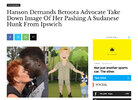JohnStoppafarty
Bench
- Messages
- 2,667
That's clearly B grade school yard at worst.says the man with the username of Stoppafarty
You should stick to twizzling. That's what you do. And you do it very well too.
That's clearly B grade school yard at worst.says the man with the username of Stoppafarty
Yet he still hasn't been sent for a HIA.He's now become Angus Old.
There are occasions when a person has to visit a bank. We're not all onboard with AI tech yet. Wait until cash is banned.Why do you need to go to a bank branch?
Been a topic I have noticed on here I think it's time to put this discussion on the table fact or fiction.
Guilty!!Been a topic I have noticed on here I think it's time to put this discussion on the table fact or fiction.
Are you a Mean Girl?
From the workplace to parties, Mean Girls live on into adulthood, long after leaving school. And you may be one of them, without even knowing. How’s how to tell.
The Mean Girl.
The Queen Bee.
The Popular Girl or The Cool Kid.
The Leader of the Pack (brrmm, brrmm … sorry, I couldn’t go past the Shangri-Las reference).
Everyone knows one … and if they don’t, perhaps they were one. The social hierarchy of high school is well-known. But what happens when you grow up? What happens when you leave high school and head into the workforce, travel or start a family? What happens to mean girls when the world is no longer just a quadrangle, a classroom, and a patchy grass oval?
Of course, there isn’t one answer. Everyone is different. Some see the error of their ways, develop empathy, and feel guilt about the past. Some probably don’t even realise they were ever mean. And others … others turn into mean adults.
Mean girls often thrive on social dominance, which doesn’t necessarily disappear after high school. Instead, it can evolve and adapt to new environments. As these girls grow into women, their social strategies might change, but the underlying behaviours often remain. Schoolyard tactics of exclusion, gossip, and manipulation can transform into workplace politics or competitive parenting.
Former mean girls might use water cooler gossip to undermine colleagues, or form office cliques that echo their high school days. As mothers, mean girls might channel their need for power into playground battles – competing over who has the best birthday parties, the most accomplished children, or the closest-knit group of mum friends.
I’ve dealt with my fair share of “mean girls” over the years. There was the customer service job where one woman would quite literally give me the silent treatment if I succeeded in a way she perceived as a threat. I can still remember the feeling of shock when I smiled and said hi to her at a trade show, and she walked straight past me with her eyes averted, like I simply didn’t exist.
Then there was the school mum who blocked me from all her social media after an altercation between our kids. I saw another mother excluded from her friendship circle after her drunken vent about a mate was exaggerated and passed on to the wrong ears.
So why does the typical “mean girl” make for such a compelling main character in everything from classic novels to modern television? They’ve always been a staple in literature and media, but why do we keep exploring this toxic persona?
For one thing, they make perfect villains, driving the plot forward with their schemes and power plays. They’re relatable – most people have encountered one at some point in their lives, and they can evoke strong emotions.
Most standard narrative arcs need a conflict and a resolution. Mean girls are a natural source of conflict; their actions create tension and keep the audience engaged. The resolution can come from the satisfaction of their defeat or from their redemption.
But despite this, I sometimes wonder … does the mean girl truly exist outside of fiction? Aren’t we more than the sum of our actions? Think back to high school and you can probably label several of your old classmates: the sporty one, the academic, the rebel, the outcast, the nerd. Now try and classify yourself. I’m guessing you don’t fall neatly into one of those narrow categories, because of course you’re more nuanced than these oversimplifications.
Regardless, I still couldn’t help writing one of those classic mean girls into my latest novel, Every Last Suspect, as the protagonist. Harriet is a career woman, a wife and a mum, but she’s also a bit of a bitch … which is why she has plenty of suspects to consider as she lies on the floor, bleeding from a head wound, attempting to solve her own murder
But is she more than just a mean girl? After all, she has her redeeming qualities and motivations. A complicated relationship with her parents, an innate desire to protect those that she loves. Yes, she’s assertive, direct and manipulative, but that’s because she’s learned this behaviour over the years as a way to survive.
Whether as antagonists or protagonists, mean girls provide rich material for exploring themes of power, growth, and redemption. But ultimately, the mean girl is more than her high school persona. She is a complex individual with her own struggles, motivations, and capacity for change. And if we look back at our past, we can likely all find moments where we’ve engaged in a bit of mean girl behaviour of our own.
HOW TO TELL IF YOU’RE THE MEAN GIRL
We’ve delved into the world of mean girls and their compelling portrayal in narratives. But here’s the kicker: could you possibly be one of them? Take a moment to reflect with the following questions. If you find yourself nodding along, it might be time for a little self-reflection.
1. Can you identify another mean girl within your close circle?
Mean girls often attract one another like magnets. If you find yourself cosying up to someone who exhibits similar toxic traits, perhaps it’s time to reconsider your friendship dynamics.
2. Do you get carried away with gossiping or badmouthing others?
Queen bees thrive on spilling the tea, especially if it can help manipulate a situation. If you catch yourself frequently indulging in watercooler gossip, it may be a red flag.
3. Are you quick to judge others, especially behind their backs?
A flair for pinpointing flaws in others is another hallmark skill of the classic mean girl. If you’re always on the lookout for someone else’s shortcomings, you might need to reassess your approach.
4. Do you feel a sense of superiority in social situations?
Operating from a place of perceived self-importance is well and truly on-brand for mean girls. If you find yourself looking down on those around you, it’s time to tame your ego.
5.How do you react when someone challenges you on your behaviour?
Mean girls don’t take kindly to being confronted. If you find yourself becoming defensive or dismissive when someone calls you out on your actions, it’s worth examining why that might be.
If the above points are feeling familiar and you don’t like what you see: Don’t stress. Recognition and admission are the first steps towards change. It’s never too late for some healthy self-improvement.
The article misses the point that merkins become mean girls when they're in a group.
The article misses the point that merkins become mean girls when they're in a group. It's why the movie is called Mean Girls, not Mean Girl. Being bitches to outsiders is how they keep the group together.
or behind a keyboard



 www.betootaadvocate.com
www.betootaadvocate.com

Ask Pauline. She apparently can dish it out, but can't take it in return.ohhhh ... so satire isn't fun anymore? ...... or only when it suits?
I don't see how Robert Irwin (or Bluey) were defamed or whatever in the video.
